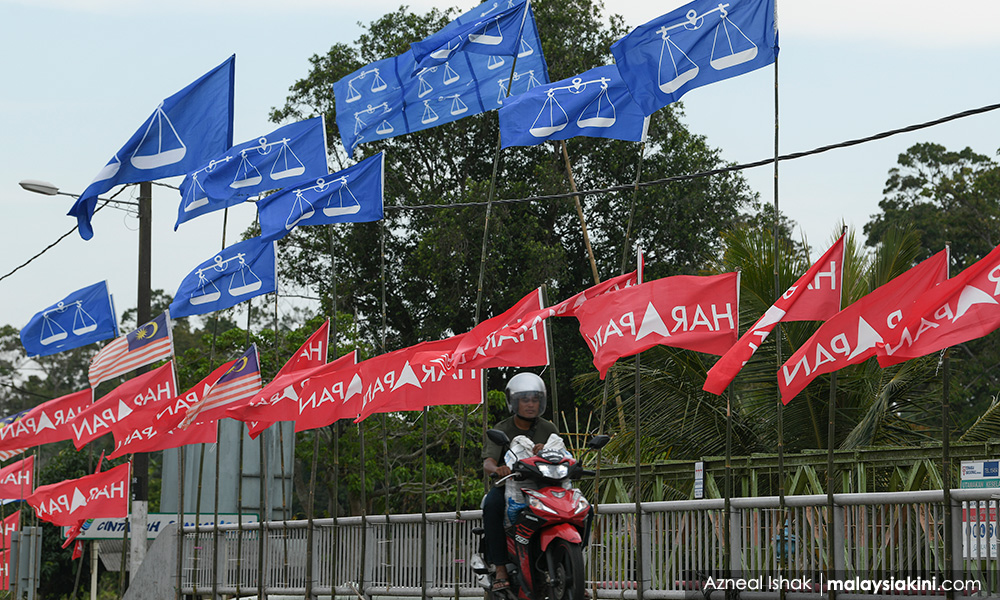COMMENT | Poll and research company Ilham Centre, which correctly predicted opposition Barisan Nasional (BN) would win in the Tanjong Piai by-election, has now correctly interpreted the meaning of this historical electoral outcome.
Its research head Yusri Ibrahim said BN’s spectacular victory in this instant, which was caused by the massive swing of Chinese votes from ruling coalition Pakatan Harapan, cannot be interpreted as Chinese support for BN or Muafakat Nasional (the new alliance between BN and PAS).
The Chinese were in truth merely using the votes in their hands to vent their anger against Harapan, and not to support BN.
While agreeing with Ilham’s interpretation, I would go a step further to narrate how this unusual Chinese fury against Harapan has become the gathering storm (manifested in Tanjung Piai) that may eventually alter the cause of our history.
Root cause of the gathering storm
In Tanjung Piai, the Chinese electoral support to Harapan has halved in the short duration of merely eighteen months, resulting in the greatest defeat suffered by an incumbent government in a by-election in the nation’s history.
This is primarily caused by irrepressible anger among the Chinese electorate against Prime Minister Dr Mahathir Mohamad for having betrayed them after they have given his coalition Harapan near monolithic support (95 percent national average) that had decisively swept the coalition into power against all expectations.
Their protest votes were also meant to give their traditionally most trusted party DAP a proper thrashing for having abetted Mahathir through its leaders’ timid silence or moral decay.
Instead of implementing sweeping reforms as pledged and ushering in a New Malaysia of greater racial equality and lesser racial discrimination that would have improved efficiency all round, which would, in turn, upgrade education and revive the economy, Harapan has done none of this.
Instead, we see the country plunging into deeper abyss of racism and religious bigotry, while the people are suffering even greater economic hardships in a stagnant system that continues to be plagued by mediocrity.

Mahathir is the culprit
And the culprit is Mahathir, who, with the docile cabinet under his autocratic thumb, has pursued his political agenda – the revival of the former Umno glory he once built with Ketuanan Melayu as its core ideology, and the delaying of Anwar Ibrahim’s (above) imminent ascension to the premiership.
Anwar, who is Harapan’s designated successor to the interim PM Mahathir, and leader of the country’s reform movement for the past two decades, would certainly have led the country in the direction of the promised Malaysia if he had been at the helm, which would make Mahathir’s Umno dream impossible.
That the Chinese sentiments in Tanjung Piai are not isolated but a pan-nation phenomenon is most emphatically manifested in Chinese audience bursting out into spontaneous jubilation even when Harapan’s crushing defeat was announced by Harapan leaders who happened to be the guest speakers at various Chinese community functions held in election night all over the country.
There is no doubt that such an electoral trend will persist in future by-elections, and even intensify if the status quo of the Harapan rule continues.
The Harapan leaders should realise by now that Mahathir’s “neither here nor there” politics wouldn’t work.
Harapan can’t outdo PAS-Umno in racial and religious extremism while attempting to retain non-Malay support with fake reforms.
That would end up in its Chinese support plunging disastrously and Malay support further receding, as shown in the Tanjung Piai by-election results where its Chinese votes descended vertically from 75 percent to 34 percent and Malay votes shrinking from already meagre 28 percent to 23 percent (Ilham statistics).
The reason is simple. While the Chinese perceive such treacherous strategy as grand betrayal, the Malays are angered by their increasing economic hardships, which in turn is due to the lack of genuine reforms that would have uplifted the economy to benefit all.

Will Harapan Presidential Council intervene?
Realising this folly, Harapan supporters who had propelled the coalition to power, are now crying out for Anwar to take over from Mahathir and save their New Malaysia dream from turning to ashes.
But, to the alarm of all, instead of stepping down at the end of his interim term, which was perceived to be two years (due in May 2020), it now appears that Mahathir intends to serve a full term until the next general election, expected to be held in mid-2023.
This is reflected in his objection to passing the baton “mid-stream” and his suggestion of a possible cabinet reshuffle before the next Apec Summit in Malaysia in November 2020.
This presents a dilemma and a challenge to the leadership of the Harapan component parties, namely, PKR, DAP and Amanah (Mahathir’s party is not mentioned here as it is under his full control).
Should they continue to do nothing while Mahathir continues to play his tricky game of power transition, this time stretching to his limit of full-term – which in all likelihood would end in its electoral rout in the next general election?
Or should the Presidential Council of Harapan (which has representations from all the component parties) intervene, and to put its foot down forcibly, if necessary and imperative to protect its vital interests?
And, of course, one cannot completely exclude the possibility that age and wisdom will finally dawn on the 94 years old leader to make a graceful exit that will earn him permanent honour in the nation’s annals while facilitating the transformation of the country to a progressive democracy that can stand tall among nations.
KIM QUEK is the author of the banned book The March to Putrajaya, and best seller Where to, Malaysia?
The views expressed here are those of the author/contributor and do not necessarily represent the views of Malaysiakini.

